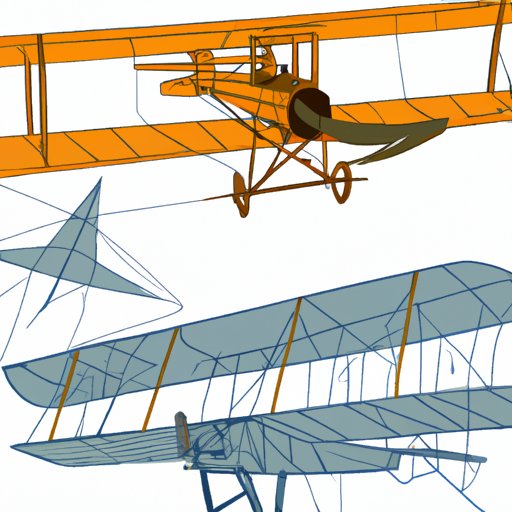Introduction
The Wright brothers are widely credited with inventing the first successful airplane. But did they really invent the airplane? To answer this question, it is important to define what an airplane is. An airplane is a powered, fixed-wing aircraft that is capable of sustained flight through the use of lift generated by its wings.
The Wright brothers have long claimed to have invented the first successful airplane. They conducted their experiments in the early 1900s and made the first powered, human-controlled flights in 1903. They continued their work over the next few years, developing the first practical airplane.
Analyzing the Wright Brothers’ Claims of Invention
To determine whether or not the Wright brothers actually invented the airplane, it is necessary to examine the evidence for their claim. Their first powered, human-controlled flights were made in 1903 and lasted only a few seconds. However, these initial flights were significant milestones in the development of the airplane.
In addition to their own experiments, the Wright brothers were also aware of the work of other early aviators. These included French aviator Clément Ader, who had made several short hops in a powered aircraft in 1897, and German aviator Otto Lilienthal, who had made over 2,000 gliding flights between 1891 and 1896.
It is clear that the Wright brothers were aware of the work of other aviators and took inspiration from them. However, it is also clear that they made significant advances in the development of the airplane, particularly in terms of design and engineering. The Wright brothers’ aircraft was the first to feature a practical control system, allowing the pilot to control the direction and speed of the aircraft.
Comparing the Wright Brothers’ Flying Machine to Other Inventions
To further understand the Wright brothers’ invention of the airplane, it is helpful to compare their flying machine to other inventions. While the Wright brothers’ aircraft was certainly revolutionary, it was not the first powered aircraft. That distinction belongs to Clément Ader, who made several short hops in his powered aircraft in 1897.
However, the Wright brothers’ aircraft was the first to feature a practical control system, allowing the pilot to control the direction and speed of the aircraft. This was a major breakthrough, as it meant the aircraft could be piloted with greater precision and accuracy. In addition, the Wright brothers’ aircraft also featured a more efficient engine and lighter materials, making it much easier to control than previous designs.
The Wright brothers’ aircraft was also the first to make use of the principles of aerodynamics. By carefully studying the behavior of birds in flight, they were able to design an aircraft that could generate lift and remain airborne for extended periods of time.
Investigating the Impact of the Wright Brothers’ Aircraft on Aviation History
The impact of the Wright brothers’ aircraft on aviation history cannot be understated. Their invention revolutionized the field of aviation, paving the way for more advanced aircraft designs. The Wright brothers’ aircraft served as the basis for many of the aircraft that followed, including the first commercial airplanes.
The Wright brothers’ aircraft also had a significant impact on aviation technology. Their innovative design and engineering allowed for the development of more powerful and reliable engines, as well as improved materials for aircraft construction. These advances allowed for longer and safer flights, which in turn led to the development of air travel as we know it today.
Examining the Wright Brothers’ Legacy in the Field of Aviation
The Wright brothers’ accomplishments in the field of aviation cannot be denied. They pioneered the development of the airplane and ushered in a new era of aviation. Their achievements are recognized around the world, and their legacy in the field of aviation continues to this day.
The Wright brothers’ legacy can be found in the modern-day aircraft that bear their name. Their original design and engineering principles are still used in the construction of today’s aircraft, and their influence can be seen in the advanced technologies used in modern aviation.
Debunking the Myth of the Wright Brothers as the Sole Inventors of the Airplane
While the Wright brothers certainly played an important role in the development of the airplane, they were not the sole inventors. Many other inventors and engineers contributed to the development of the airplane, including Clément Ader, Otto Lilienthal, and Gustave Whitehead. These inventors all made important contributions to the development of the airplane, and without their efforts, the Wright brothers’ achievement may not have been possible.
However, it is important to recognize the importance of the Wright brothers’ contribution. They were the first to develop a practical control system for an aircraft, which allowed for more precise and accurate piloting. In addition, their innovations in design and engineering laid the groundwork for the modern-day aircraft we see today.
Conclusion
The Wright brothers are widely credited with inventing the first successful airplane. After examining the evidence, it is clear that the Wright brothers made significant contributions to the development of the airplane. They developed the first practical control system for an aircraft, which allowed for more precise and accurate piloting. In addition, their innovations in design and engineering laid the groundwork for the modern-day aircraft we see today.
It is important to recognize the importance of the Wright brothers’ contribution, as well as the contributions of other inventors and engineers. Without their collective efforts, the development of the airplane would not have been possible. Their legacy in the field of aviation continues to this day, and they will always be remembered as pioneers in the field.
(Note: Is this article not meeting your expectations? Do you have knowledge or insights to share? Unlock new opportunities and expand your reach by joining our authors team. Click Registration to join us and share your expertise with our readers.)
